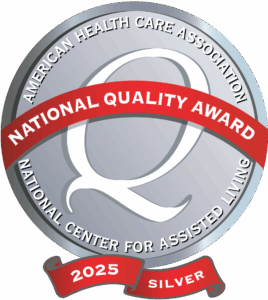Caring for a senior loved one at home can be a demanding role. Whether your family member has Alzheimer’s disease or another illness, the challenges of taking care of an older adult can feel overwhelming and could lead to a health crisis for the caregiver. That’s why it’s important for family caregivers to learn how to regularly practice healthy self-care. One way to do that is to utilize respite.
What Is Respite Care?
Respite services are designed to provide families with the support a loved one needs to allow the primary caregiver to take a break. It can be for just a few days, or it can be for an extended period of time, such as for a few weeks or even a month.
This popular type of senior care can be delivered in a variety of settings. But respite provided in a senior living community allows the primary caregiver to truly take a break and focus on themselves without worrying about whether their loved one is safe and healthy. That’s essential for being able to relax and rest so you can avoid a health challenge of your own.
Recognizing the Signs of Caregiver Burnout
Family caregivers often fail to recognize the signs of burnout before they end up getting sick or injuring themselves.
Common signs of burnout include:
- Anxiety
- Irritability
- Lack of appetite
- Depression
- Inability to sleep
- Social withdrawal
- Difficulty relaxing
Remind yourself that to be the best possible caregiver for your loved one, you’ll need to take care of yourself. That’s why finding quality respite care isn’t an indulgence—it’s a necessity.
Tips for Finding a Respite Care Provider
Connecting with a respite provider you feel confident in is important. But families often aren’t sure where to begin their search. If you need a little advice for getting started, these tips will be of interest:
- Ask for suggestions: Word-of-mouth recommendations are a good way to begin your search. Ask people you trust who are caring for an older family member if they’ve utilized respite and which provider they used.
- Conduct an internet search: As with many things now, conducting an online search can yield other options in your local community. You’ll also be able to read reviews to gain more insight.
- Visit in person: While getting recommendations from people you know and reading positive reviews are helpful, nothing beats an in-person tour of a community you are considering. It will provide you with an opportunity to meet the staff, talk to long-term residents, try the food and more. You can also explore what activities are offered and what opportunities for socializing are available.
- Be honest about needs: When you visit, be specific about what assistance your loved one requires. It’s the only way the community will be fully prepared to care for your loved one. This is especially true for adults with memory loss. You’ll want to make certain the staff is trained in dementia care.
- Clarify payment and fees: Finally, discuss compensation and payment schedules. Make sure you understand what is and isn’t included, such as medications, meals and transportation.
Respite Care provides short-term breaks to allow family caregivers to rest and restore the balance in their lives. Before summer vacation season arrives, it’s a good idea to learn more about these programs and what options are available at a location near you. Come visit us today. We’re here to help.





